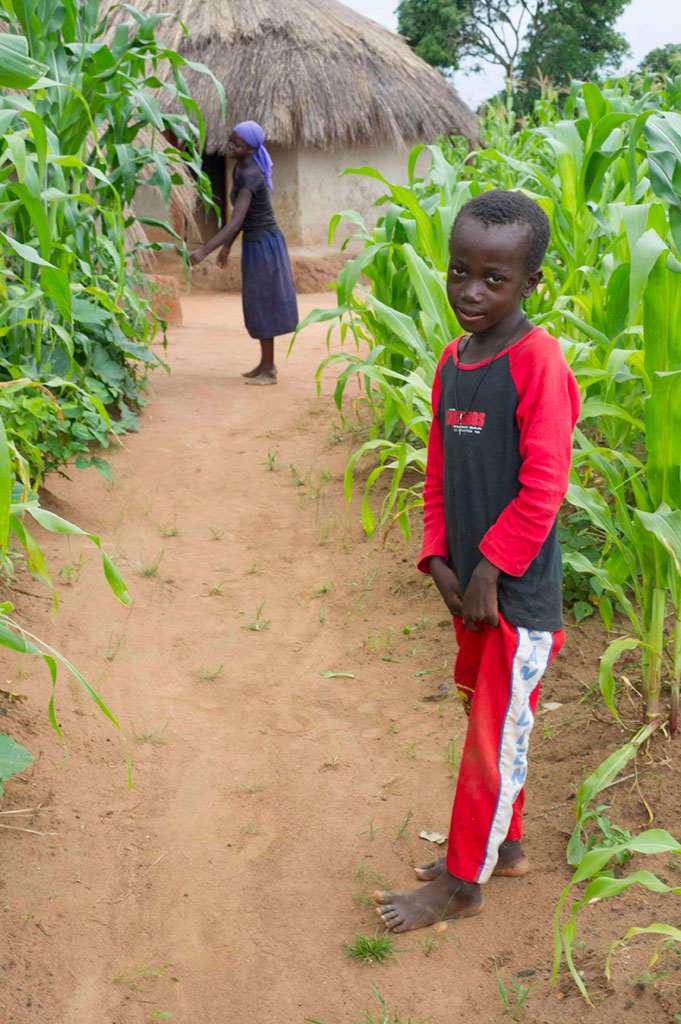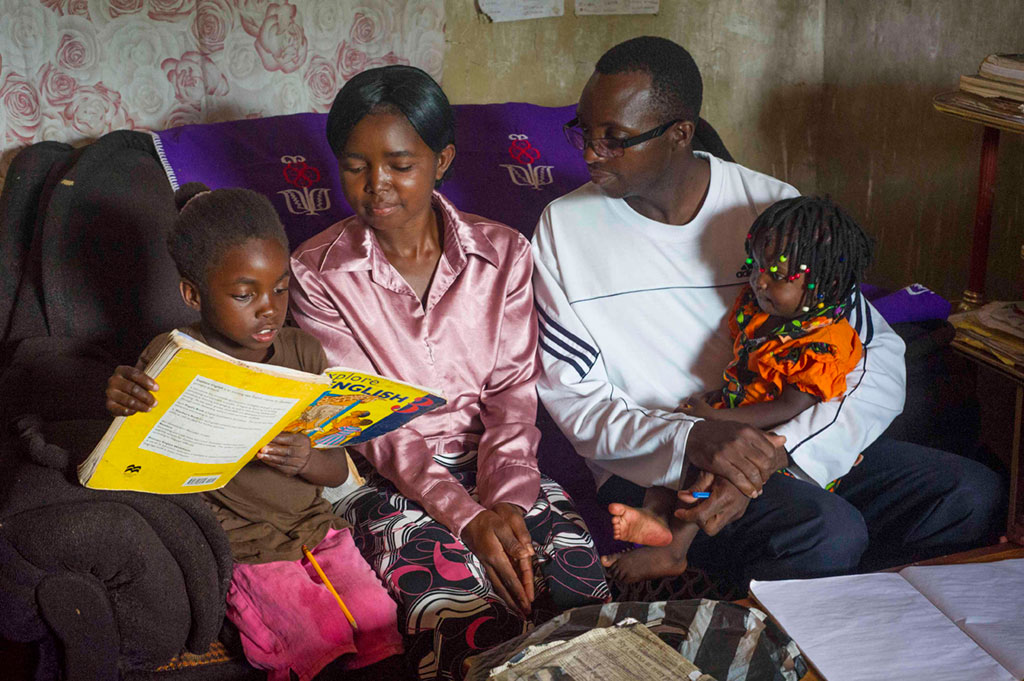Lundazi, Zambia—With storybooks scattered around him on a blanket outside his family’s hut in their rural village near Lundazi, a town in Zambia’s Eastern Province, six-year-old Nowa Ngulube announces his big dreams.
“I want to become president,” he declares.
His father, Aaron Ngulube, the community leader of Kamberere Unga village, smiles an approval for his younger son’s big dream—a dream that requires a good education and literacy. Nowa’s older brother is in the sixth grade and cannot read.
This year, Nowa’s school took part in a “whole school, whole teacher, whole learner-oriented” approach to boost early grade literacy in pupils’ local Zambian languages. Led by the Ministry of Education, Science, Vocational Training and Early Education, the USAID/Read to Succeed project aims to address five key elements common to school effectiveness: learning, teaching, school management, responsiveness to a child’s psychosocial needs and parental and community support for education.
In rural areas like Lundazi, where adult literacy rates are low and school dropout runs high, mobilizing community support for education is key to keeping pupils in school and on track for success. Parents play a critical role in inculcating a culture of reading outside the classroom and maintaining pupils’ reading gains through the USAID/Read to Succeed project, which is funded by the U.S. Agency for International Development and implemented by Creative Associates International.
“When we talk about communities, we are also talking about parents. It’s very important that we collaborate with them because the children stay with them. They come from their homes,” says Pilila Gertrude Jere, USAID/Read to Succeed Team Leader for the Eastern Province. “So, if you leave a gap, it means that the whole circle is not complete. The school and the community should be together and move together.”
Moving together for literacy

To mobilize community members and empower them to actively support learner performance and school management, USAID/Read to Succeed has established 1,204 School Community Partnership committees in schools across six Zambian provinces.
The School Community Partnerships bring parents, guardians, community leaders and educators together to discuss how to spread the culture of reading beyond the school day and improve school management, teaching quality, infrastructure and community support to the school. The project trains local committee members to guide these meetings.
Rabecca Sakala, Head Teacher at Chiginya Primary School in Lundazi, says she needs parents to be involved.
“We don’t want the parents there out there. They have to own the program, also. They have to support the program,” says Sakala. “That’s why we came up with this School Community Partnership committee, and they’re doing a tremendous job.”
Through the committees, schools prepares Learner Performance Improvement Plans with community members and display progress on school walls so parents can see what is working and where additional support is needed. Teachers regularly invite parents to observe lessons to see how their children are progressing and how the teachers use the new phonics-based methods in class, which can help parents provide more effective assistance to pupils at home.
In participating schools across Zambia, School Community Partnerships have launched innovative initiatives to enhance the reading culture, not only in the school but also in the villages—from adult literacy classes so parents can better assist children at home to the construction of reading shelters at schools that give pupils more opportunity to practice their reading skills.
With Creative’s whole child, whole teacher, whole school approach, “the school is not only owned by the teachers or the pupils,” says Lidah Mbewe, Head Teacher at Lutembwe Primary School in Chipata, the capital of Eastern Province. Community members “are free to come in at any time, find out whatever they want to find out, and assist wherever, in whichever way they can assist.”
Empowering communities with a sense of ownership of their schools and the project is imperative to long lasting progress for pupils and the success of the project.
“A learner is ours when she or he is in school, but when she or he goes home, again, the parents must continue where the teachers have all stopped. Learning does not only take place at school, even at home it has to continue,” says Mbewe. “So when we put all these things together, it means we’re helping this poor child to progress.”
Down the road from Nowa Ngulube’s family in the Ngonyala village, Donald Zimba says he has seen progress in a short time through USAID/Read to Succeed. His son, daughter and niece have made strides in their reading and writing, he says, and the community’s relationship with the school has grown stronger.
“There is a unity between the parents and teachers,” says Zimba. “When the children are stuck, the parents are called to see what the children are doing. This is improving the reading culture.”
Supporting neighbors to keep children in school

In many rural, poor or agricultural communities around Zambia, challenges outside the classroom can threaten the gains made in school and derail learners from moving forward.
Early marriages, illness, or needing to work to support the family contribute to higher rates of pupils’ absenteeism in these areas.
Additionally, HIV/AIDS has left more than 670,000 children orphaned throughout the country, according to UNICEF data from 2012. More than 1.4 million Zambian children are orphans due to HIV/AIDS and other causes combined.
“We have a challenge of a number of vulnerable children that have got no support. So we have high number of [orphans and vulnerable children] in our schools,” says Herbert Mwiinga, District Education Board Secretary in Lundazi.
For these vulnerable children, USAID/Read to Succeed’s School Community Partnerships are filling the gap. The committees hold community dialogues on special care and support to orphans and vulnerable children and spread important messages about preventing HIV/AIDS, lowering school absenteeism and delaying early marriages. The committees have also trained others on how to speak out about these issues.
Through home visits and outreach, School Community Partnership committees across beneficiary school have encouraged parents to send their children, and especially their girls, back to school.
From 2013-2014, pupils’ attendance across all USAID/Read to Succeed districts rose nearly 3 percent on average, from 72.95 percent to 75.47 percent across all participating school districts in 2014.
Some districts showed substantial improvements—for example, pupils’ attendance in Isoka, Muchinga Province climbed by 27 percent.
The activities of the School Community Partnership committees are shifting norms around the value of education and school attendance. With community support, some schools in the Mongu District of Western Province formulated by-laws that compel parents to send their children to school. According to the agreement, if a child misses school for two consecutive days without a reason, parents are reported to the village headman for action.
In many of the schools, community members have also stepped in to tender school gardens and provide meals at school for pupils to incentivize school attendance for children who would otherwise go without food.
Community support brings sustainable progress
With the ongoing engagement and investment of the community, educators and government officials say they are confident that positive outcomes of USAID/Read to Succeed will be sustained long after the project itself comes to an end.
“We have to continue the program. Why?” asks Sakala. “Because the community now has been sensitized on the importance of participation. And they know the importance of education. Meaning that even if [USAID/Read to Succeed] goes away, we will still continue.”
District Education Board Secretary Mwiinga agrees, noting that pupils’ success in reading also brings greater benefits back to the communities.
“If they are able to read, and then comprehend what they are reading, then it means we have opened a lot of gates for them for future success at the individual level, but also eventually for the family, and then for the larger community,” he says.
